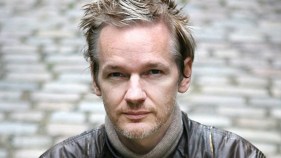 Facebook is “the most appalling spying machine ever invented,” according WikiLeaks founder Julian Assange, who recently spoke with Russia Today, while awaiting extradition from England to Sweden on sexual assault charges.
Facebook is “the most appalling spying machine ever invented,” according WikiLeaks founder Julian Assange, who recently spoke with Russia Today, while awaiting extradition from England to Sweden on sexual assault charges.
“Here we have the world’s most comprehensive database about people, their relationships, their names, their addresses, their locations, their communications with each other, and their relatives, all sitting within the United States, all accessible to US Intelligence,” said Assange during the interview.
Assange asserts that Google, Yahoo and other US-based technology companies are also complicit in the US government’s aims to keep watch over the world’s citizens.
“Facebook, Google, Yahoo, all these major US organizations have built-in infaces for US intelligence,” he said. “It’s not a matter of serving a subpoena, they have an interface they have developed for US Intelligence to use. Now, is the case that Facebook is run by US Intelligence? No, it’s not like that. It’s simply that US Intelligence is able to bring to bear legal and political pressure to them. It’s costly for them to hand out individual records, one by one, so they have automated the process.”
Assange goes on to say that anytime anyone adds information to their Facebook profile they “are doing free work for US intelligence agencies.”
The WikiLeaks founders’ proclamations of tech giants’ Big Brother operations follows recent revelations that Apple, Microsoft and Google collect location-related information about customers who use devices that run their iOS, Windows Phone 7 and Android mobile operating systems.
Revelations about so-called Location-gate sparked outrage (and a lawsuit) among customers, who were appalled that their mobile devices were used to keep track of their approximate movements. The uproar caused Apple CEO Steve Jobs to respond to the criticism, saying that “Apple is not tracking your iPhone.” Instead, “Apple is now collecting anonymous traffic data to build a crowd-sourced traffic database with the goal of providing iPhone users an improved traffic service in the next couple of years,” according to statement posted on the company’s website.
With the public becoming seemingly more wary of its supposedly “private” data being used by corporations, is Facebook the next to face its collective wrath?
Watch the full Assange interview below (Facebook comments begin around the 2:00 mark):


